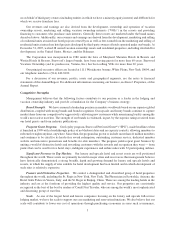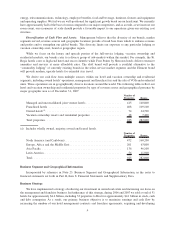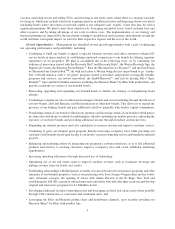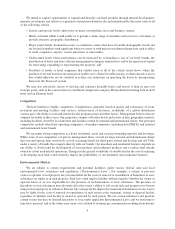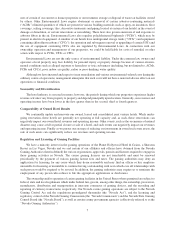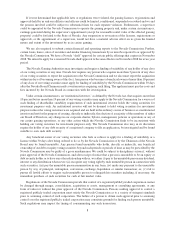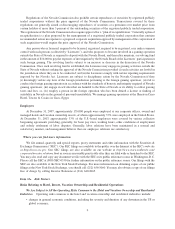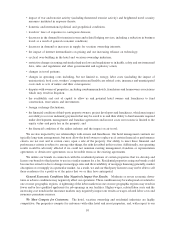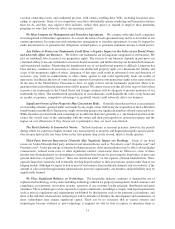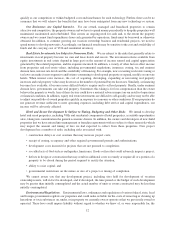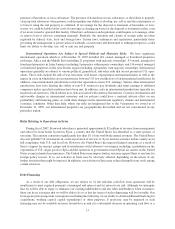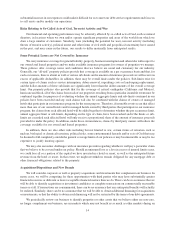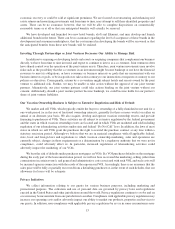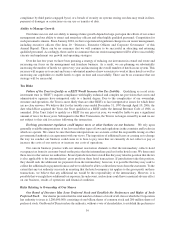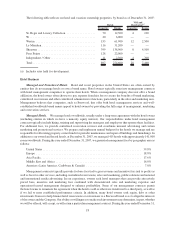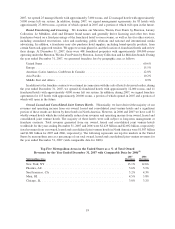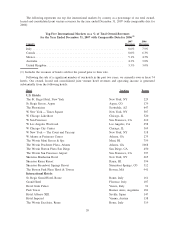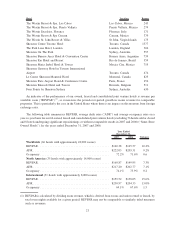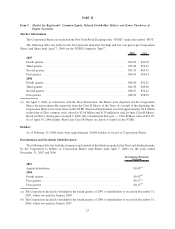Starwood 2007 Annual Report Download - page 77
Download and view the complete annual report
Please find page 77 of the 2007 Starwood annual report below. You can navigate through the pages in the report by either clicking on the pages listed below, or by using the keyword search tool below to find specific information within the annual report.presence of hazardous or toxic substances. The presence of hazardous or toxic substances, or the failure to properly
clean up such substances when present, could jeopardize our ability to develop, use, sell or rent the real property or
to borrow using the real property as collateral. If we arrange for the disposal or treatment of hazardous or toxic
wastes, we could be liable for the costs of removing or cleaning up wastes at the disposal or treatment facility, even
if we never owned or operated that facility. Other laws, ordinances and regulations could require us to manage, abate
or remove lead or asbestos containing materials. Similarly, the operation and closure of storage tanks are often
regulated by federal, state, local and foreign laws. Certain laws, ordinances and regulations, particularly those
governing the management or preservation of wetlands, coastal zones and threatened or endangered species, could
limit our ability to develop, use, sell or rent our real property.
International Operations Are Subject to Special Political and Monetary Risks. We have significant
international operations which as of December 31, 2007 included 261 owned, managed or franchised properties
in Europe, Africa and the Middle East (including 21 properties with majority ownership); 53 owned, managed or
franchised properties in Latin America (including 9 properties with majority ownership); and 136 owned, managed
or franchised properties in the Asia Pacific region (including 4 properties with majority ownership). International
operations generally are subject to various political, geopolitical, and other risks that are not present in U.S. oper-
ations. These risks include the risk of war, terrorism, civil unrest, expropriation and nationalization as well as the
impact in cases in which there are inconsistencies between U.S. law and the laws of an international jurisdiction. In
addition, some international jurisdictions restrict the repatriation of non-U.S. earnings. Various other international
jurisdictions have laws limiting the ability of non-U.S. entities to pay dividends and remit earnings to affiliated
companies unless specified conditions have been met. In addition, sales in international jurisdictions typically are
made in local currencies, which subject us to risks associated with currency fluctuations. Currency devaluations and
unfavorable changes in international monetary and tax policies could have a material adverse effect on our
profitability and financing plans, as could other changes in the international regulatory climate and international
economic conditions. Other than Italy, where our risks are heightened due to the 9 properties we owned as of
December 31, 2007, our international properties are geographically diversified and are not concentrated in any
particular region.
Risks Relating to Operations in Syria
During fiscal 2007, Starwood subsidiaries generated approximately $2 million of revenue from management
and other fees from hotels located in Syria, a country that the United States has identified as a state sponsor of
terrorism. This amount constitutes significantly less than 1% of our worldwide annual revenues. The United States
does not prohibit U.S. investments in, or the exportation of services to, Syria, and our activities in that country are in
full compliance with U.S. and local law. However, the United States has imposed limited sanctions as a result of
Syria’s support for terrorist groups and its interference with Lebanon’s sovereignty, including a prohibition on the
exportation of U.S.-origin goods to Syria and the operation of government-owned Syrian air carriers in the United
States except in limited circumstances. The United States may impose further sanctions against Syria at any time for
foreign policy reasons. If so, our activities in Syria may be adversely affected, depending on the nature of any
further sanctions that might be imposed. In addition, our activities in Syria may reduce demand for our stock among
certain investors.
Debt Financing
As a result of our debt obligations, we are subject to: (i) the risk that cash flow from operations will be
insufficient to meet required payments of principal and interest and (ii) interest rate risk. Although we anticipate
that we will be able to repay or refinance our existing indebtedness and any other indebtedness when it matures,
there can be no assurance that we will be able to do so or that the terms of such refinancings will be favorable. Our
leverage may have important consequences including the following: (i) our ability to obtain additional financing for
acquisitions, working capital, capital expenditures or other purposes, if necessary, may be impaired or such
financing may not be available on terms favorable to us and (ii) a substantial decrease in operating cash flow or a
13


